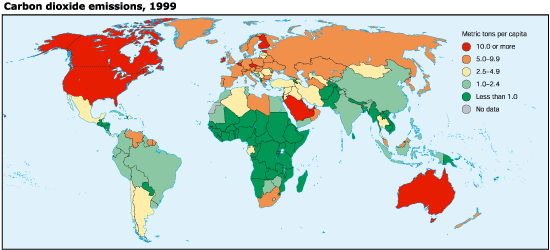There are potential hydrological problems to be addressed if hydrogen fuel vehicles are to become a significant form of transportation. In the best possible scenario, hydrogen fuel would be produced from the electrolysis of seawater by wind energy. This scenario places no stress on the freshwater supply, so it could be assumed that the electrolysis of seawater is the most likely candidate as a source of hydrogen fuel. The scarier issue might be the change in hydrology due to increased water vapor in the air. Precipitation is more likely to occur when saturated air is lifted. Directly east of both Los Angeles and the Bay Area are significant mountain ranges. The probability of precipitation will increase in these mountain ranges. What does this mean? The Sierras could cast a precipitation shadow over the western US, which could have significant effect on the hydrology of these states. Given that Colorado River basin is already tapped for its water resources, significant loss of snow pack due to increased precipitation in the Sierras could exacerbate these problems. Hypothetically, say that California institutes policy that encourages the use of fuel cell vehicles and targets complete transition to hydrogen-based transportation fuels by 2030. There are approximately 20 million registered automobiles in California, with the vast majority being located in the Bay Area and Los Angeles County. Given the potential problems with large scale, concentrated emission of water vapor, California’s best option to reduce greenhouse gas emissions and prevent new ecological problems is to promote transition to fully electric and ethanol hybrid vehicles.

There have been speculations about the negative side effects of hydrogen fueled vehicles for many years. However, I don't think they should deter consumers from purchasing these vehicles in the future. Sole dependence on any single fuel source is going to reap negative side effects in one area or another. I think we should focus on diversifying our fuel sources between hydrogen, electric, and standard oil, in order to lesson the overall negative side effects on any one source.
ReplyDeleteIt seems to be that whether we are driving exclusively fossil fuel based vehicles or hydrogen fuel based vehicles we are having the same problem. Both types of vehicles emit large amounts of greenhouse gases (carbon and water vapor), so maybe the answer is not a full fledged transfer to one single source of fuel. The answer appears to be diversification of fuel sources because there are byproducts associated with nearly every kind of fuel.
ReplyDeleteAnother problem with the cost-effectiveness of hydrogen fuel cells in vehicles is the required energy input to move the heavy hunks of metal. If cars were manufactured with strong but light-weight carbon fiber and the over all weight of cars and SUVs significantly decreased, hydrogen fuel cells and any type of fuelled engine for that matter would be much more efficient and effective in automobiles.
ReplyDeleteCurrent development encourages continued research into hydrogen fuel cells as a viable alternative fuel source. Technologies are not far from prototype stages in which the water vapor is never emitted from the car, but instead contained in a closed system. The water vapor byproduct is subjected to electrolysis and can therefore be used again as the hydrogen fuel. With this system, there are literally no emissions whatsoever from fuel cells, making them a viable alternative.
ReplyDeleteI think the effects of increased precipiation are still hypothetical. Climate change may effect this increased precipitation even more, either negatively or positively. I think if one has to choose between a car that runs on fossil fuels or a car than runs on hydrogen, the latter would always be the better choice. As people become more aware of climate change and as the effects begin to be visually seen, more people may switch to public transportation. In which case there wouldn't be 20 million cars on the road at all, fossil fuel or hydrogen. Before we start worrying about the effects, we should start worrying about the implementation.
ReplyDelete